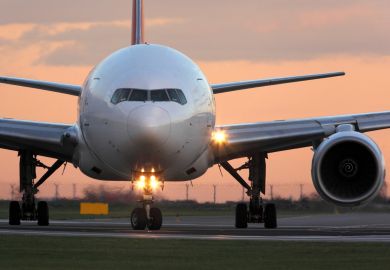Internationally mobile students are “warming” to the prospect of quarantine and the inevitability that they will need to complete at least part of their courses remotely, as the reality of pandemic lockdown sinks in.
A survey of about 4,000 prospective international students suggests they are gaining confidence that Covid-19 will not derail their dreams of overseas degrees, with 74 per cent expecting to commence their studies at the time planned – up from 69 per cent when a similar survey was conducted in April.
The study unearthed an increasing willingness by students to start their courses online and transition to campus-based study when that became feasible. Forty per cent of respondents cited such an arrangement as their preference, up from 31 per cent in the earlier survey.
The proportion preferring to wait for face-to-face classes fell from 38 per cent to 34 per cent.
Overall, 77 per cent said that they were willing to undergo quarantine if necessary, but this largely hinged on government or institutional support. Sixty-five per cent of respondents said that organised accommodation during quarantine would be important to them, with 47 per cent worried about food availability and 43 per cent concerned about airport transfers and support for physical and mental health.
The study was conducted by IDP Connect, the market intelligence division of international education services company IDP Education. It quizzed roughly 4,300 people studying or intending to study at institutions in Australia, Canada, New Zealand, the UK and the US.
Typically, respondents hailed from India and held offers of enrolment at the postgraduate level. Some had also participated in the April survey of about 6,900 people.
IDP Education chief executive Andrew Barkla said that government and industry discussions had mostly focused on visas, pilot flights and the mechanisms of quarantine. “But it is just as important that we are developing solutions in line with student expectations and their willingness to participate – and frankly, helping them get here,” he said.
“The research findings serve as a reminder that we need to continually put ourselves in our students’ shoes. Rather than communicating about policy and domestic-focused rhetoric, our sector must provide students and their parents with clear, practical and aligned information and support.”
Respondents intending to study in Canada, the UK and Australia generally proved more willing to start their courses online than to wait until face-to-face classes resumed. But Mr Barkla said that while some students were “warming to the option and understand the situation”, many were “still holding out for that full on-campus experience”.
This spelt particular danger for Australia, where pilot plans to fly in thousands of students have been scuttled following an upsurge in coronavirus cases in Melbourne. Meanwhile, UK universities are understood to be pressing ahead with charter flights – despite the country’s much greater Covid-19 caseload – while Canada allows entry to students with valid study permits.
Mr Barkla warned about ongoing ramifications for Australian universities. “This is not only about 2020. We need to look longer term.
“We know from decades of research that one of the most reliable predictors of where students go to study is where their friends, family members and community networks are. If students are diverted en masse from Australia this year, we could see a generational shift in international student flows…towards the UK and Canada.”
Register to continue
Why register?
- Registration is free and only takes a moment
- Once registered, you can read 3 articles a month
- Sign up for our newsletter
Subscribe
Or subscribe for unlimited access to:
- Unlimited access to news, views, insights & reviews
- Digital editions
- Digital access to THE’s university and college rankings analysis
Already registered or a current subscriber?








